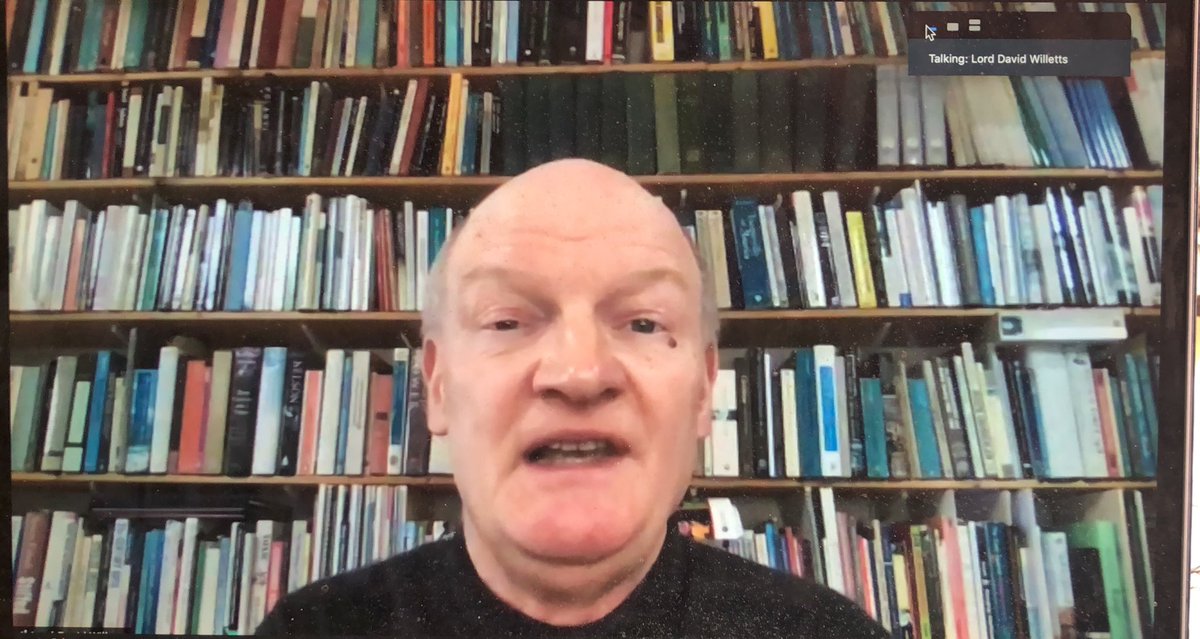Our webinar this morning is opened by @wgmin_education, who focuses on the strengths of the Welsh student funding system (eg on part-time students & postgraduates) and also raises concerns about the impact of decisions in England on other parts of the UK, and specifically Wales.
Now on to Lord Willetts (and his impressive bookshelves), who takes a different approach to that outlined in the recent HEPI paper by Alan Roff and calls instead for reforms to reduce the RAB charge - eg via a lower repayment threshold and a longer repayment term.
Lord Willetts ends with a plea for a quinquennial review on the broad outlines of student finance rather than ripping up the system.
Alan Roff, the author of HEPI’s latest report on student finance, issued last week, starts by listing what he sees as the pros and cons of the student loan scheme, with a particular focus on the high level of individualised debt.
In a “civilised” society, high-paid graduates should keep on paying for the higher education system after they’ve extinguished the costs of their own education, argues Alan Roff. He also argues that past graduates should pay in to a new graduate contribution scheme too.
Our final speaker on the panel, @jsherrarduk from @ucu, criticises the high fees system in England but also emphasises the costs of good online education, which mean universities do need secure funding in the crisis. She calls for a grants-based system, with more £ from employers
The first Q is on whether employers should pay more for higher education. Seems to be a consensus that they might, but disagreement over how. HEPI’s paper on this by @JohnnySRich is here: https://www.hepi.ac.uk/2018/11/29/employer-contributions-replace-fees-relieve-student-debt-argues-new-hepi-paper/
Get rid of the ‘arbitrary’ limit on the number of years student loans are repaid for, argues Alan Roff. He points out income tax doesn’t stop after a fixed number of years and stresses he is keen to get away from the idea of *individualised* debt.
Q from Sir David Melville (former VC of @MiddlesexUni and former Chief Executive of the Further Education Funding Council for England), who argues the current student loan system is too uncertain and cannot easily be extended to FE courses, asks our speakers if it is fix-able.
David Willetts says ‘the Government has no record of the country’s graduates. ... No one knows who these graduates are.’
So, he argues, it is not possible to impose an extra tax on all graduates now: you would have a 20-year funding gap.
So, he argues, it is not possible to impose an extra tax on all graduates now: you would have a 20-year funding gap.
Fee refunds are a tricky question, staff have worked incredibly hard to make sure learning is happening and some models for refunds wouldn’t even put any £ back in students’ pockets, argues @jsherrarduk from @ucu.
Fee refunds are a ‘dangerous’ idea opposed to students’ interests, argues David Willetts. Students wouldn’t get more cash in their pockets now (just pay off their debts a little earlier in the future, at best) and institutions would get less to support their students.
David Willetts says students have genuine grievances but he firmly rejects fee refunds.
David Willetts adds that he regrets students costs are labelled ‘tuition fees’ as the money covers so many different things and institutions have lots of different cross-subsidies. He describes student debt as ‘a very peculiar form of debt’.
David Willetts: I wish the student support system was called a graduate contribution scheme instead because that’s what it is, but the ship had sailed even before the post-2012 system was devised.
Alan Roff argues that even if 18-year olds understand the logic of the post-2012 system, new graduates are shocked by their loan statements and parents dislike the system.

 Read on Twitter
Read on Twitter



